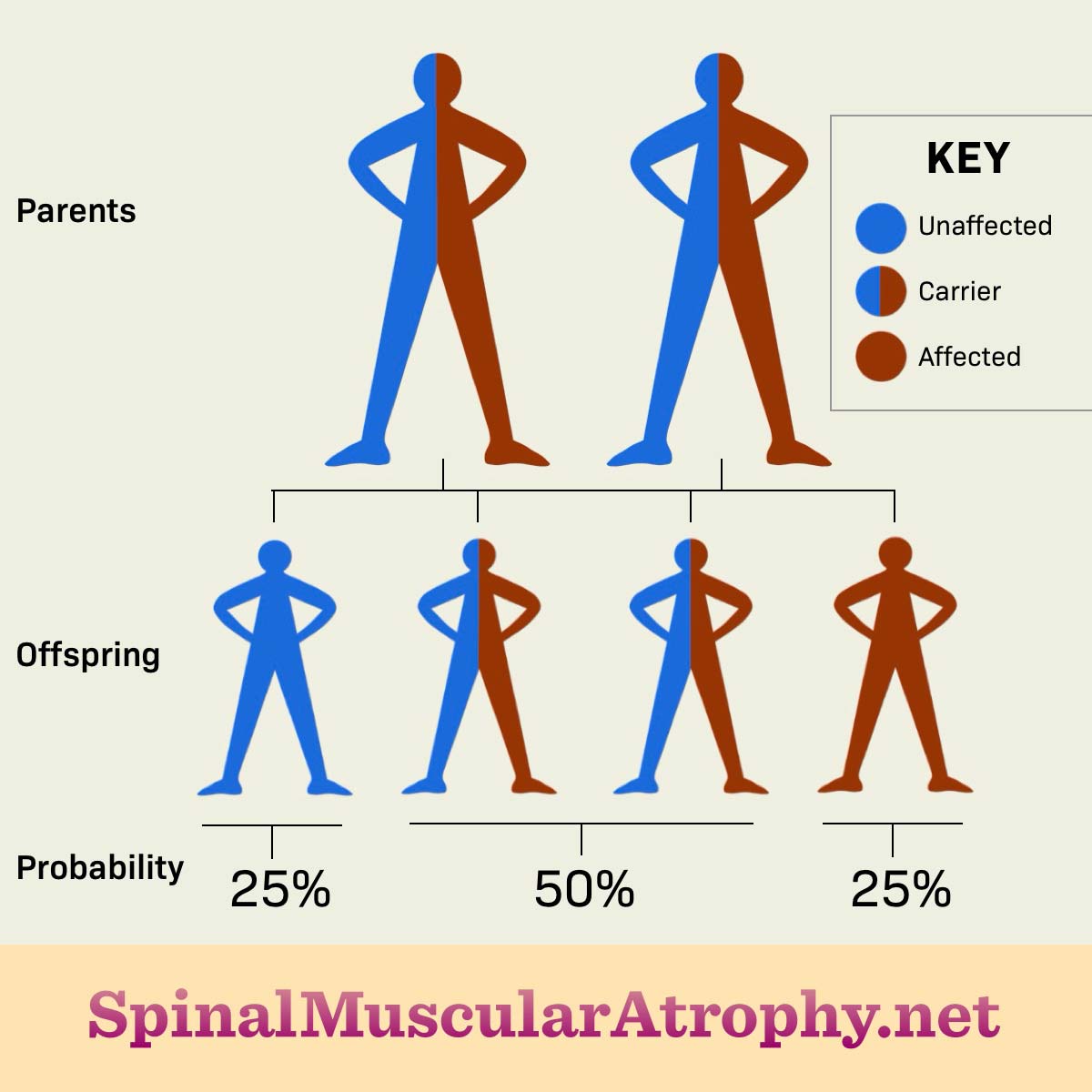What Causes Spinal Muscular Atrophy?
Reviewed by: HU Medical Review Board | Last reviewed: August 2021 | Last updated: October 2025
Spinal muscular atrophy (SMA) is a genetic disorder. This means that SMA is inherited by children from their parents, and it is present at birth. It is caused by mutations (changes) in a gene called SMN1. This gene is important for the survival of brain cells that communicate with muscles.1
All major forms of SMA are inherited in an autosomal recessive pattern. “Autosomal” means that the mutated gene is present on a non-sex chromosome. This means it is not linked to sex. “Recessive” means that both copies of the SMN1 gene have to be mutated to have SMA.
Understanding how SMA is inherited can help you talk to your doctor or genetic counselor about the condition.
How is spinal muscular atrophy inherited?
All major forms of SMA (types 0 to 4) are inherited in a “recessive” pattern. This means that both copies of the SMN1 gene must be mutated to have SMA. We inherit 2 copies of all of our genes, 1 from each parent. People with SMA inherit 1 mutated copy of SMN1 from each parent.1
Usually, the parents of someone with SMA each carry 1 mutated copy of the SMN1 gene. This means that the parents are carriers of SMA. They do not show symptoms of SMA but can pass the mutated gene to their children. About 1 in 40 people are carriers of SMA.2,3
When 2 carriers of SMA have children, the child has a:1
- 25 percent chance of having SMA (inheriting 1 mutated copy of SMN1 from each parent)
- 50 percent chance of being a carrier (inheriting 1 mutated copy of SMN1 from 1 parent and 1 normal copy of SMN1 from the other parent)
- 25 percent chance of not having SMA or being a carrier (inheriting 1 normal copy of SMN1 from each parent)
Figure 1. Carrier chart of SMA probability
Some rare types of SMA are inherited in a “dominant” pattern. This means that just 1 mutated copy of the gene is enough to show symptoms. People with these rare types of SMA usually inherit 1 mutated gene from a parent with SMA symptoms and 1 normal gene from a parent without symptoms.4,5
These types of SMA are caused by mutations in genes other than the SMN1 gene. For example, Finkel-type SMA occurs when only 1 copy of the mutated VAPB gene is inherited.4,5
Is this condition linked to sex chromosomes?
The major forms of SMA (types 0 to 4) are not linked to sex chromosomes. Men and women are equally likely to have SMA. This is because the SMN1 gene is located on chromosome 5, which is not a sex chromosome. This is an example of an “autosomal” inheritance. Autosomes are any chromosomes that are not sex chromosomes. This means the major forms of SMA are inherited in an “autosomal recessive” pattern.2,5
We have 22 pairs of autosomes, and 1 pair of sex chromosomes. The pair of sex chromosomes in men is comprised of an X and a Y chromosome. Women have 2 X chromosomes. Some rare forms of SMA are caused by alterations in genes on X chromosomes. These forms are inherited in an “X-linked recessive” pattern. Men are affected by X-linked SMA more often than women. This is because men only need 1 altered copy of the gene to show symptoms, since they only have 1 X chromosome.4,5
For example, spinal and bulbar muscular atrophy (also called Kennedy disease) is an X-linked form of SMA caused by mutations in the AR gene.5
Can SMA be prevented?
SMA and other genetic conditions cannot be prevented. If you know you have SMA, carry the SMA gene, or have a family member with SMA, you may want to talk to a genetic counselor. They can provide:6
- Information about your chance of having SMA or being a carrier
- Testing to see if you have SMA or are a carrier
- Details about the results of genetic tests
- Help determining if other family members have SMA or are carriers
- Information about the risk of having a child with SMA
- Prenatal testing for SMA if both parents are carriers
The choice to have a child is personal and should be made by the parents. Genetic counselors can give you the information you need to make an educated decision. They can also help you prepare for possible outcomes of pregnancy.
